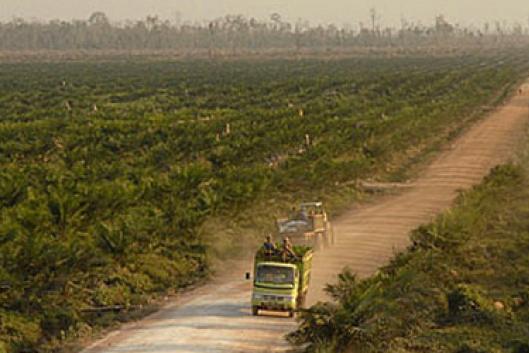From January 28-31, 2016, in Mundemba in southwest Cameroon, two international meetings took place on the expansion of oil palm cultivation and the global oil palm industry, in particular in Africa. The first meeting was a discussion workshop among women focused on the impacts of oil palm monoculture on women and their families, as well as current and possible strategies they could develop to defend their interests. The second gathering, called a “global workshop,” examined the strategies and tactics that companies use to increase their industrial oil palm plantations, and how communities react to defend their lands.
These workshops brought together fifty leaders from communities near industrial oil palm plantations, as well as representatives of national and international NGOs from four continents. Participants came from Cameroon, Congo-Brazzaville, Ivory Coast, the Democratic Republic of the Congo (DRC), Gabon, Guinea, Nigeria, Brazil, Canada, Germany, Indonesia and Switzerland, to exchange their experiences.
Strategies and tactics to increase expansion of industrial oil palm plantations
The workshops in Mundemba identified several strategies and tactics companies use to defeat, even by force, opposition to their expansion projects. To do this, they:
- pressure local authorities to refuse to register community organizations or unions that oppose their plans to expand, and convince them to intervene and confiscate small machines that farmers use to produce their own oil palm;
- control communities by organizing “dialogues” with traditional leaders and important people, and at the end of the meeting, give them envelopes with money; those who do not accept are not invited again;
arrive in communities, and to obtain their support, offer bribes to chiefs and local leaders, or other gifts (drinks, food, motorcycles, etc.) especially to women; or they propose to dig wells;
- sometimes they perform cadastral surveys of the land without obtaining consent or informing the local population;
- organize meetings concerning the project and then attach a false list of participants to the meeting documentation, making it look like a community accepts the project;
- say that the project has the President's support and can no longer be stopped; they claim that, in the absence of land titles, the lands belong to the government and therefore communities do not have the rights that would enable them to stop the project;
- employ a “divide and conquer” strategy: for example, they convince one family to give up their land, while the rest of the community is opposed to the project;
- offer jobs and contracts to important people within the population, and later use them as project spokespeople;
- propose miserable compensation to the poorest communities;
- stop buying from small farmers, who traditionally were suppliers for the company;
- intimidate community leaders who oppose the project, and sometimes even jail them or pass them off as 'terrorists';
- try to market their plantation projects as a way to combat climate change and generate wealth;
register under different names in order to confuse communities and make them think the company belongs to a local group;
- seek dialogue with (international) NGOs but not with communities, so that the NGOs are responsible for negotiations and opening doors.
These multiple tactics and strategies confront different forms of resistance on the part of communities, whose actions are conditioned by the specific environment in which they are built.
Creating conditions for community resistance
The gatherings in Mundemba enabled community members to define actions they can take to defend their lands.
First of all, the struggles must be based on communities' customary rights to land. Additionally, the solutions must come from united communities, in which women, youth and men speak as one. This is how communities obtain great power. United and strong, communities can strengthen that power by cooperating with other organizations and communities locally and internationally. Together, such alliances can define their own plans, different from the companies', the governments' or bodies such as the Roundtable on Sustainable Palm Oil (RSPO).
It is important to ensure that the whole community participates in decision-making. For this, it is important to avoid decisions made behind the scenes. It is also necessary to strengthen the economic autonomy of local leaders and personalities, to prevent them from being tempted by bribes, since they are the preferred targets of investors. It was agreed that poverty and the continuing lack of roads and other basic facilities that the government should provide make communities vulnerable to companies' promises of "development".
During the meetings, participants insisted on the need to form alliances to take joint actions in places or countries affected by the same company, as in the case of Unilever or Socfin / Bolloré, or create an international tribunal to ensure the protection of human rights, and in which communities can seek redress.
The idea to pressure food companies sourcing palm oil from industrial plantations was also noted, as well as the importance of influencing in the political arena, in order to achieve legislative and institutional reforms.
Both workshops concluded with strong statements. One summarizes the women's gathering under the framework of “Women and the expansion of oil palm and industrial palm oil.” The other, from the “global workshop,” is a manifestation of solidarity with the communities in the state of Ndian, Southwest region of Cameroon, who struggle daily to defend their lands.
Both final declarations can be accessed at these links:
http://wrm.org.uy/other-relevant-information/mundemba-declaration-and-statement-of-solidarity/
Marie Crescence, radd2009@yahoo.fr
The aforementioned meetings were organized by three local organizations:
- SEFE (Struggle to Economize Future Environment)
- RADD (Réseau des Acteurs du Développement Durable)
- With advice from CED (Centre pour l’Environnement et le Développement)
In cooperation with the international organizations WRM and GRAIN, and with funding from Pain pour le Prochain.
